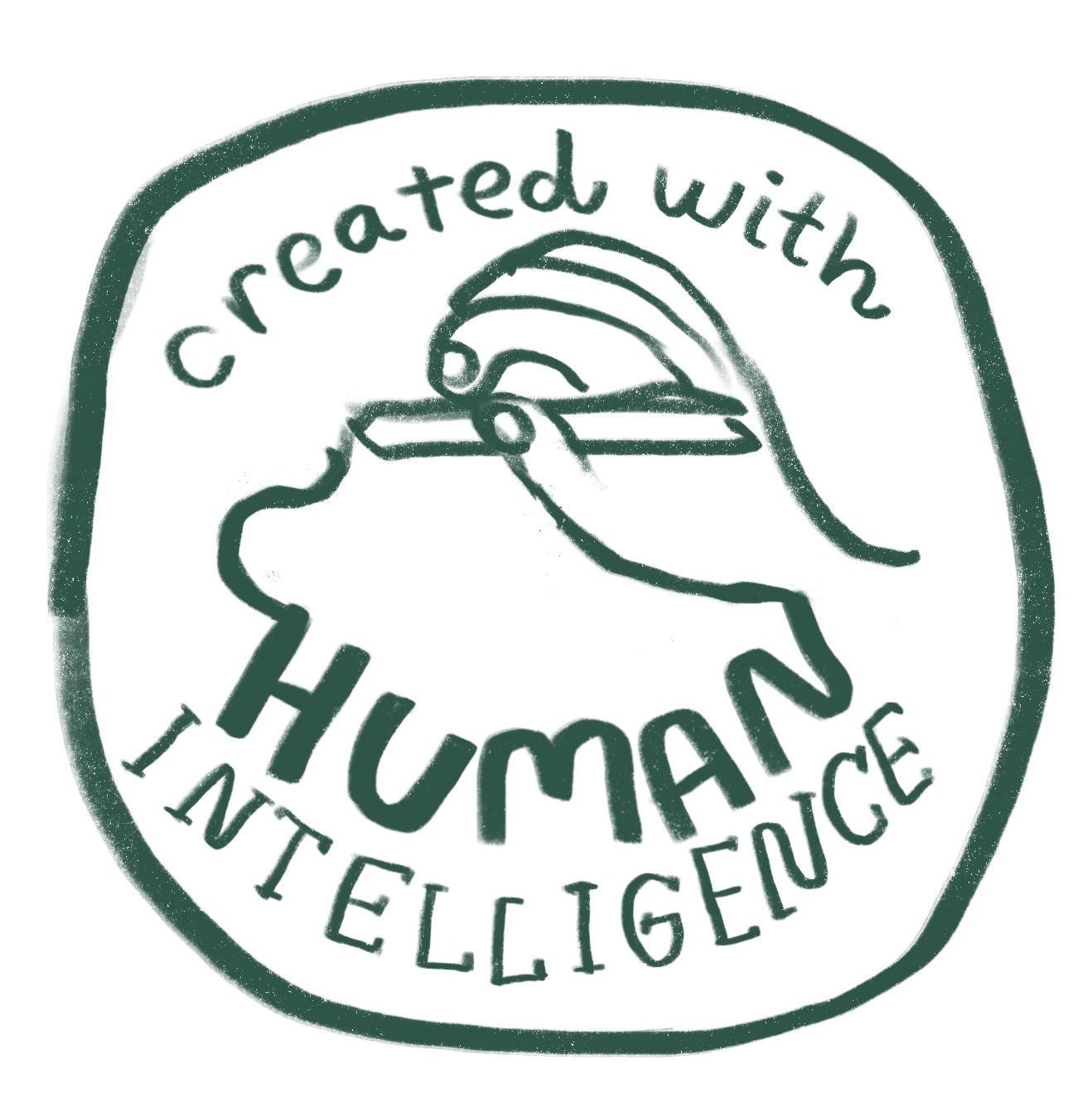Commonplace #10
Some things that recently caught my interest
Exploring Life through the Written Word
Dear Friends,
May has slowly taken us from spring into the fledgling days of summer. I have read very little this month, instead choosing to spend my time outdoors or enjoying time with family. I haven’t missed the internet. My phone has stayed on my desk with the ringer turned off. The long walks with Lola have been an opportunity to admire growing things in our neighborhood and say hi to friends emerging after winter. One neighbor, Mr. Joe, carries doggie treats in his pocket and passes them out to all the dogs he sees. Lola is greedy and begs for two. Mr. Joe complies because he is a softy and loves dogs.
Until we have begun to go without them, we fail to realize how unnecessary many things are. We've been using them not because we needed them but because we had them.
- Lucius Annaeus Seneca
Things of interest:
Amy Hoppock writes Smaller & Deeper, a weekly invitation to notice life's small, ordinary moments and ponder their deeper meaning. Recently she shared a Practice for June which I plan to try myself.
Peco and Ruth Gaskovski share the story of their digital fast this past Lent in a recent essay, Beyond Digital Fasting.
I have been a fan of Mandy Patinkin for years. He is a performer of the very highest rank. I was pleased to see my friend, Kert Lenseigne 🌱, share an essay recently that focuses on what we teach our children. In it he features a performance by Patinkin that you will not want to miss. The essay is called, It’s All They Know and you should give it a read.
Dana Leigh Lyons discusses How Do You Want to Use Your Time?
Ryan B. Anderson shares thoughts on marriage in his essay, Your Children Need to See You Kiss.
Joel J Miller discusses The Quiet Collapse of Reading.
Bill Davison has been an inspiration for my budding interest in birding and nature studies. His recent essay, How the Warbler Descends, is a wonderful reflection on humbly embracing our place in the world.
Alexandra Fasulo quit her corporate life to buy a small farm in New York. Her writing focuses on the future of farmland in the U.S.
Mary Roblyn is the one writer whose essays I read without fail. What I Learned in My Second Year as a Widow continues her examination of life and grief. Her writing is compelling and imminently human.
Andrea Bass shares 45 Things Public Libraries Can Offer You.
Personal Reading:
The Rest of the Robots by Isaac Asimov. This is a collection of eight science fiction short stories centered on robotics and artificial intelligence. I read it as a part of my personal reading program to read all of Asimov’s Robot and Foundation series this year. These stories expand upon Asimov’s Three Laws of Robotics and explore the ethical, practical, and societal implications of advanced robotic technology. The collection is divided into two thematic sections. The first section of stories features Dr. Susan Calvin, a robopsychologist at U.S. Robots and Mechanical Men, Inc, and follows her investigations into robot behavior and malfunctions. The second section are general robot stories spanning various time periods and settings within Asimov’s larger fictional universe. They explore the development and consequences of robotic integration into human society. I recommend this book if you are a fan of sci-fi, futuristic tech, and robots.
The Summer Book by Tove Jansson. I read this as part of the Beyond the Bookshelf reading program. This is a gentle, luminous novel that captures the quiet beauty of summer and the intimate bond between generations. Set on a small, remote island in the Gulf of Finland, the book follows six-year-old Sophia and her wise, witty, and sometimes irascible grandmother as they spend the summer exploring nature, engaging in philosophical conversations, and navigating the joys and sorrows of life. Told through a series of loosely connected vignettes, the novel portrays their daily routines, small adventures, and quiet reflections on death, love, and the passing of time. The grandmother’s understated wisdom and Sophia’s curious, sometimes fierce spirit create a compelling intergenerational dialogue that is both poignant and humorous. Jansson’s prose is spare, poetic, and deeply attuned to the rhythms of the natural world. The island setting becomes almost a character in itself, evoking solitude, wonder, and the transformative stillness of summer. A celebration of simplicity, nature, and the emotional depth of everyday life, The Summer Book is a quietly powerful meditation on aging, memory, and the enduring connections that shape us. I recommend this book if you love reading about interpersonal relationships, a strong sense of place, or heartwarming books of gentle wisdom.
The Naked Sun by Isaac Asimov. This is the second novel in the Elijah Baley series and a sequel to The Caves of Steel. I read it as a part of my personal reading program to read all of Asimov’s Robot and Foundation series this year. It is a science fiction mystery set on the planet Solaria, one of the Spacer worlds known for its low population and reliance on robots. The story follows Detective Elijah Baley of Earth, who is sent to Solaria to investigate the murder of a prominent roboticist, Dr. Rikaine Delmarre. Baley is once again partnered with the humanoid robot R. Daneel Olivaw, a representative of the Spacer worlds. Solaria is characterized by extreme social norms: its residents live in isolation on vast estates and communicate almost exclusively through holographic “viewing” rather than face-to-face interaction, which they find repulsive. The society is heavily reliant on a large robotic workforce. As Baley investigates, he navigates the challenges of Solarian customs, distrust of Earthmen, and his own discomfort with open spaces. The murder appears to be impossible under the laws governing robot behavior, particularly the Three Laws of Robotics. Baley uncovers the truth by identifying inconsistencies in the robots’ actions and the psychological states of the human suspects. The novel concludes with the resolution of the mystery, revelations about the societal vulnerabilities of Solaria, and Baley's growing awareness of humanity's potential future in space colonization. I recommend this book if you are a fan of sci-fi, futuristic tech, and robots.
The Unmapping by Denise Robbins. I received this book for free from the author as an Advance Reading Copy (ARC). Denise Robbins’s debut novel is a literary speculative fiction set in a surreal, ever-shifting New York City. At 4 a.m., the city’s buildings inexplicably rearrange themselves—landmarks like the Empire State Building suddenly appear in unexpected locations, such as Coney Island. This phenomenon, termed “the Unmapping,” recurs nightly, plunging the city into chaos: power grids fail, thousands go missing, and the urban landscape becomes unrecognizable. Central to the narrative are Esme Green and Arjun Varma, employees of New York’s Emergency Management team. Esme grapples with bureaucratic challenges while searching for her missing fiancé, Marcus. Arjun is dedicated to rescuing disoriented residents amidst the turmoil. As scientists seek explanations and enigmatic “red cloak” cults emerge, both characters confront personal and societal upheavals, exploring themes of identity, resilience, and the human capacity to adapt. The Unmapping intertwines elements of climate fiction, magical realism, and dystopian narrative, offering a poignant exploration of how individuals and communities respond to unprecedented disruptions. Robbins’s storytelling delves into the emotional landscapes of her characters, reflecting broader questions about change, loss, and the search for meaning in uncertain times. The phenomenon of the Unmapping is an idea I had never encountered in my reading and I found it to be an intriguing concept. I would recommend this book if you are a fan of sci-fi, dystopian, magical realism, and speculative fiction.
Music:
My son David shared this with me and I thought it was a nice song to share with you.
Final Thoughts:
Thank you to all my subscribers. You are amazing. I have appreciated your support as I have learned the ins and outs of publishing twice a week over the past year and a half. Beyond the Bookshelf is continuing to evolve as a publication and I will be announcing a few adjustments in the coming weeks. I hope you will continue to enjoy the work we are doing here. But if you feel that this is no longer for you, then I understand that as well. We all have a finite amount of time and we have to prioritize how we spend it. I am grateful for all of you and wish you the best in whatever manner you desire to spend your time.
Beyond the Bookshelf is a reader-supported publication. Becoming a paid subscriber is the single most impactful way you can support the mission of exploring the connection between life and literature here at Beyond the Bookshelf. An annual subscription is only $12/year.
If you can’t commit to a paid subscription at this time but would still like to support my work, please visit my support page for a list of other ways you can help keep the lights on.
Until next time,







Thank you for your reflections of May, which mirror much of my own recently. I'm glad you enjoyed The Summer Book, which I think is a perfectly meditative book for a reflective spring/summer.
Matthew- I've never read any Asimov (and very little science fiction overall) but wanted to dip my toe in. I have Foundation on my list of future reads--do you think this would be a good first Asimov, or is there something else you might recommend?